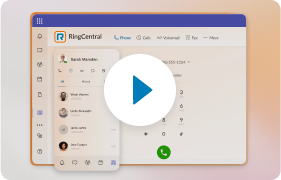Like our personal lives, our professional lives are practically unrecognizable from just six months ago. Remember overpriced popcorn at the movie theatre? I’d pay what some would consider an irresponsible amount of money for a tub of those yellow clouds of pure joy right now.
However, being the adaptable species we are, we’ve found ways to juggle remote working, virtual classrooms, virtual happy hours, and drive-by birthday trains. Are those still a thing? The point is everything we do now is different. The way we connect with friends, with family, with co-workers, and with our community is different.
The new work-from-home normal
The current state of our world has revealed so many things to us. Perhaps the most obvious of them is our need to communicate. More than that, it’s shown us just how flexible our communications systems need to be to return some sense of normalcy to our daily lives. Every day, we hear truly remarkable stories about how companies, often with no notice, had to have their entire staff work from home virtually overnight.
Some say that every network is a beautiful snowflake. It’s unique. Now, IT teams are suddenly in charge of hundreds of home networks (ugly snowflakes) instead of just the thing of beauty they had been carefully crafting for the better part of a decade.
After the initial shock of the immediate shift to working from home, we began to realize that maybe our teams weren’t equipped with everything they needed to communicate effectively in this new world.
At many companies, some employees went rogue and adopted various video conferencing or other collaboration platforms in an effort to get what they needed. Others wrote daily to remind IT of their current technology limitations. Meanwhile, IT is expected to keep everything working in perfect order, all with aging gear that’s been meeting some—but not all—of your needs.
So where do we go from here?
We go forward.
Technologies to support the future
Forward means a single communication platform that can meet all of the incredibly complex needs of the 2020 professional work environment. And not just for end users (although we’d bet that even Douglas would be happy for once) but for the IT staff, sales leadership, and perhaps most importantly, for the CFO and the bottom line.
Forward means a financially backed 99.999% uptime SLA. RingCentral understands that right now every message, every video meeting, and every phone call are critical. They need to work—every time, period. We also understand that application overload for your employees is a problem.
Too many separate apps for communication and collaboration actually hurts productivity because your employees spend too much time toggling between apps. And that’s also a problem for those who support your employees. It’s why we enable users with messaging, video, and phone all in one application. Even better, it’s all managed from one place. So if employees have questions, there’s only one number to call.
We also understand that IT teams are already working overtime, and a switch to a new cloud-based communication system is intimidating (not to mention potentially time consuming). That is why our professional services team is composed of professionals with years of experience with just about every on-premise system out there.
They have an intimate knowledge of what works (and what doesn’t) relative to those platforms, and how to successfully migrate you and all of your end users to the cloud.
What does forward look like for you? We would love the opportunity to help get you there.
Originally published Oct 27, 2020












